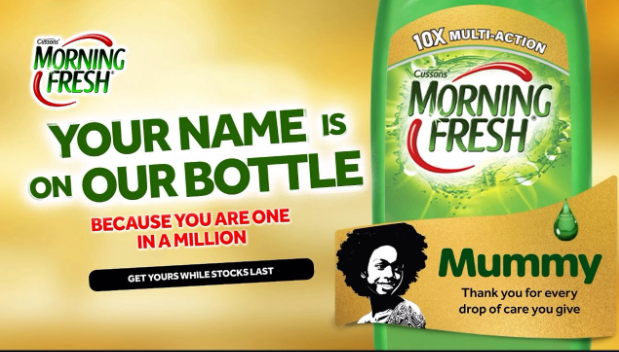
|
Getting your Trinity Audio player ready...
|
On Thursday, June 5, 2025, Morning Fresh Nigeria launched the #MyNameMyBottle campaign, inspired by Coca-Cola’s “Share a Coke” initiative. However, unlike Coca-Cola’s inclusive naming approach, Morning Fresh exclusively used female names and titles such as Bimbo, Chioma, Adesuwa, Dupe, Ruqquayat, Jessica, Bestie, Wifey, Queen, and Mummy, effectively gendering dishwashing as an inherently female duty. This ad doesn’t just lack diversity, equity and inclusion, but it reinforces domestic stereotypes, framing women as the custodians of cleanliness and care.
Sexist advertising remains a persistent and insidious issue in Nigeria, with many campaigns reinforcing deeply entrenched patriarchal ideologies that perpetuate harmful stereotypes through their titles, visuals, and narratives.
The social media backlash was swift as X users highlighted that the campaign reinforces gender roles and stereotypes. User LadiSpeaks pointed out the mimicry of Coca-Cola’s campaign: “Inspired by Coca Cola Share a Bottle campaign, I’m guessing Morning Fresh lmao.”
The post has garnered over 231k views and 259 retweets as people share different opinions on the campaign and what it represents. OYEDAYO retweets, “Morning Fresh really said: only women need dish soap.”
Other users criticised the exclusion of men and ethnic diversity, with Lafemmefola highlighting how the campaign ignores the 21st-century reality of shared domestic labour.
“Morning Fresh isn’t aware that we’re in the 21st century, and washing plates isn’t a gendered thing, or what??” Another X user, Fazy, emphasised the lack of inclusive representation across Nigeria’s diverse ethnic groups, calling out the ad’s Yoruba-centric naming, “This gender-based campaign would fly with the purple Morning Fresh, during Women’s Month, seeing that it was introduced around then. Also, Nigeria has other tribes; is this one only for Yoruba women? Because I can’t find either of my names, from English to native.”
User Nneka_viv underscores a larger consumer consciousness around gendered branding. She recalls deliberately avoiding products labelled with “Mama” due to their implicit gender coding — a trend that Morning Fresh seems to have ignorantly re-entered. “Interesting how I stopped buying any domestic item that has “mama,” in it. From Mama Lemon to Mamador. Morning Fresh was safe. Guess it no longer is.” Iwuesearabmoney queries, “How they approved this absolute rubbish is beyond me. Who still uses Morning Fresh anyways??? No one.”
The #MyNameMyBottle campaign is not an isolated misstep. Morning Fresh’s historical ads from the 1990s consistently reinforced regressive gender norms, portraying women as solitary dishwashers while their husbands prepare to eat. The latest campaign continues this tradition by glorifying unpaid female labour and domestic virtue as ideal feminine traits. The absence of male names not only excludes men from domestic responsibility but subtly teaches that dishwashing is a woman’s role.
This pattern is visible across other Nigerian brands. Indomie’s Mama Do Good and Onga’s Mama’s Helping Hand frame women’s value in culinary ability and measure of wifely worth, reinforcing the idea that a woman’s identity is tied to domestic performance. Dettol’s “Because You Care” cements the image of women as default caregivers, omitting male involvement in nurturing. MTN’s “Mama na Boy” advert further entrenched gender bias by celebrating the birth of a male child, inadvertently validating cultural preferences for sons over daughters.
Entertainment mirrors society; these ads collectively reinforce deep-rooted structural sexism, reducing women to domestic, decorative, or submissive roles while excluding men from emotional and domestic responsibilities. These representations do not simply reflect cultural norms. They actively reproduce and legitimise them, which upholds systems of inequality and hinders efforts toward gender justice in media and society.
These ads and campaigns rarely depict women in professional or leisure contexts. Instead, they romanticise female sacrifice, hustle, and guilt, continuing the legacy of overburdened, hyper-productive women. Nicola Jane Hobbs’s poignant reflection rings true: “Growing up, I never knew a relaxed woman… but I would like to become one.” This quote encapsulates the exhaustion embedded in gender roles perpetuated by the media. Nigerian advertising must evolve to reflect egalitarian realities, showing men in kitchens, fathers in caregiving roles, and women in empowered, rested, and multifaceted representations.
Sexist advertisements are not only out of date; they are also destructive. Critically challenging it, dismantling it, and replacing it with narratives that empower people of all genders and represent true social fairness are all necessary steps towards gender equality.




